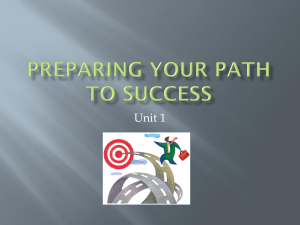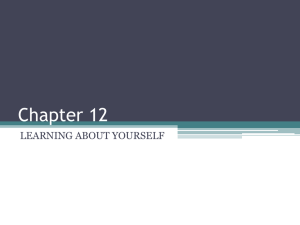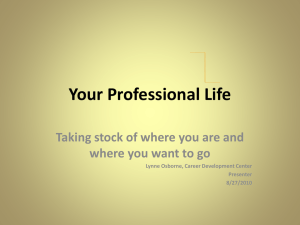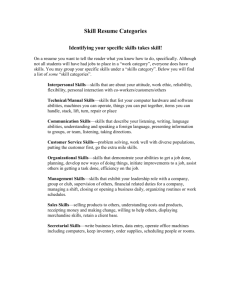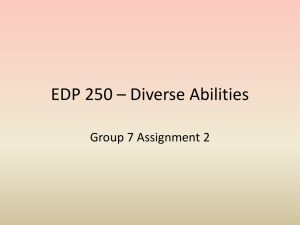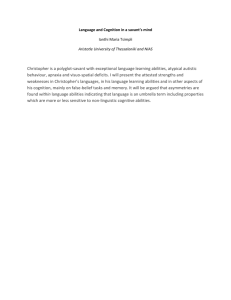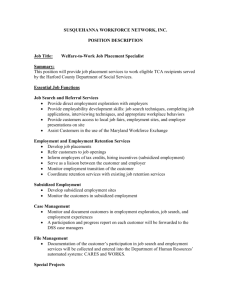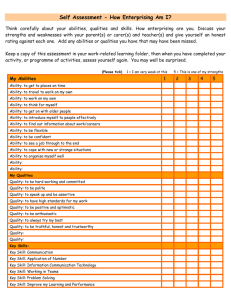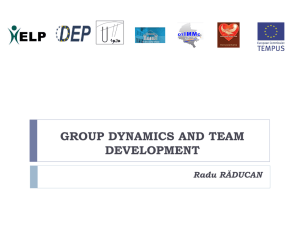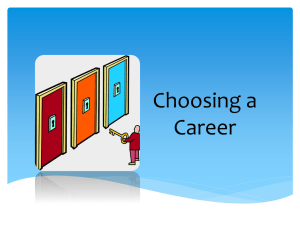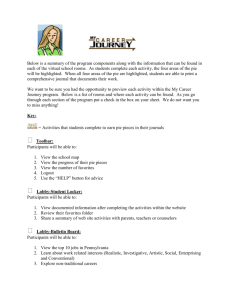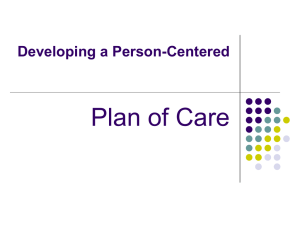STEP 1: Self-Exploration - University of Evansville
advertisement
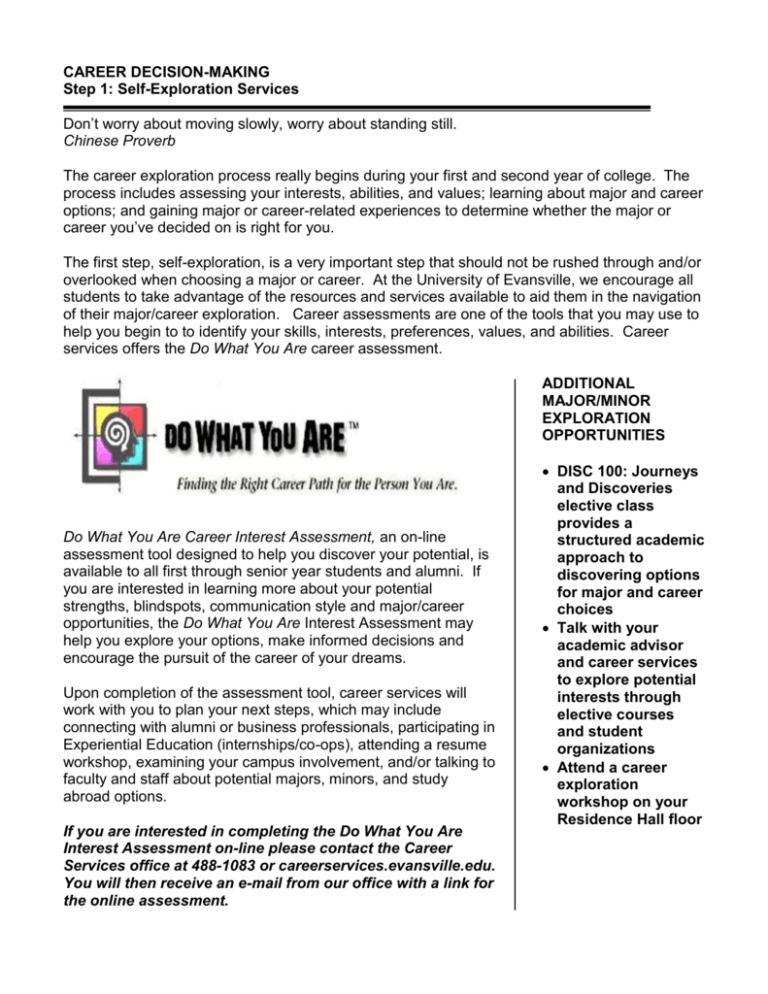
CAREER DECISION-MAKING Step 1: Self-Exploration Services Don’t worry about moving slowly, worry about standing still. Chinese Proverb The career exploration process really begins during your first and second year of college. The process includes assessing your interests, abilities, and values; learning about major and career options; and gaining major or career-related experiences to determine whether the major or career you’ve decided on is right for you. The first step, self-exploration, is a very important step that should not be rushed through and/or overlooked when choosing a major or career. At the University of Evansville, we encourage all students to take advantage of the resources and services available to aid them in the navigation of their major/career exploration. Career assessments are one of the tools that you may use to help you begin to to identify your skills, interests, preferences, values, and abilities. Career services offers the Do What You Are career assessment. ADDITIONAL MAJOR/MINOR EXPLORATION OPPORTUNITIES Do What You Are Career Interest Assessment, an on-line assessment tool designed to help you discover your potential, is available to all first through senior year students and alumni. If you are interested in learning more about your potential strengths, blindspots, communication style and major/career opportunities, the Do What You Are Interest Assessment may help you explore your options, make informed decisions and encourage the pursuit of the career of your dreams. Upon completion of the assessment tool, career services will work with you to plan your next steps, which may include connecting with alumni or business professionals, participating in Experiential Education (internships/co-ops), attending a resume workshop, examining your campus involvement, and/or talking to faculty and staff about potential majors, minors, and study abroad options. If you are interested in completing the Do What You Are Interest Assessment on-line please contact the Career Services office at 488-1083 or careerservices.evansville.edu. You will then receive an e-mail from our office with a link for the online assessment. DISC 100: Journeys and Discoveries elective class provides a structured academic approach to discovering options for major and career choices Talk with your academic advisor and career services to explore potential interests through elective courses and student organizations Attend a career exploration workshop on your Residence Hall floor SELF-EXERCISE: ASSESSING YOUR INTERESTS, ABILITIES AND VALUES INTERESTS Naturally, you will want to choose a career in a field that interests you. However, as simple as that sounds, many people rarely take the time to reflect about their interests! Exploring your interests is an important step in self-exploration in order to narrow down potential major and career opportunities. We challenge you to use the following questions to begin a list of your interests. 1. 2. 3. 4. 5. 6. 7. 8. What organizations are you involved in? What role do you play in those organizations? What sort of classes do you enjoy taking? Are there any subjects in which the readings or assignments seem enlightening and worthwhile rather than time-consuming? Any subjects you have continued exploring beyond the requirements of a class? What do you start conversations about? What kind of books do you read for pleasure? What TV stations or internet sites you do you spend the most time on? What job would you do for free? * Note: Interests, like skills, can be easily expanded by introducing yourself to new subjects, organizations, and people. UE is an ideal environment for you explore and discover your interests! ABILITIES Everyone has personal strengths. Whether they are a natural talent and/or learned skill. The key is to identify your particular strengths and identify how they are transferable to different career fields. For example, if you are an excellent chess player, you may be good at working under pressure, strategizing, setting goals, etc. There are several careers that need people with those skills. To get started identifying your skills and abilities, ask yourself the following questions: 1. Are there any subjects in which you have done consistently well? 2. Could you tutor another student in a certain subject area? 3. What do your friends and family come to you to ask for help in? 4. What contributions do you usually make in group work? (ie: brainstorming, organizational skills, leadership) VALUES Knowing your interests, skills and abilities will often not narrow your range of potential career opportunities. Therefore, you should also consider your work-related values to help identify satisfying careers. For example, it is not always what you want to do in relation to a career, but also where, when and how you want to work. A person interested in a sales career will also need to ask him or herself: What kind of product do I want to work with (tangible or intangible)? What is the company’s attitude toward its clients and customers? Does the company provide an opportunity to travel? Is there opportunity for advancement within the company? Etc. Your values develop from a variety of sources, therefore you will need to prioritize and examine what values will be the most important to you. The following is a list of career-related values. Imagine which values will be most important to you five year from now and 10 years from now. Which careers would best match these values? Advancement Compatible Co-workers Diversity Flexible Hours Leisure Time Power and Influence Travel Benefits Competition Easy Commute High Earnings Leadership Prestige and Status Variety Challenge Contribution to Society Excitement Independence On The Job Training Rewards Choice of Environment Creativity Family Life Moral Fulfillment Power and Influence Security Adapted from the University of Missouri-Columbia Career Center and the NACE Foundation
